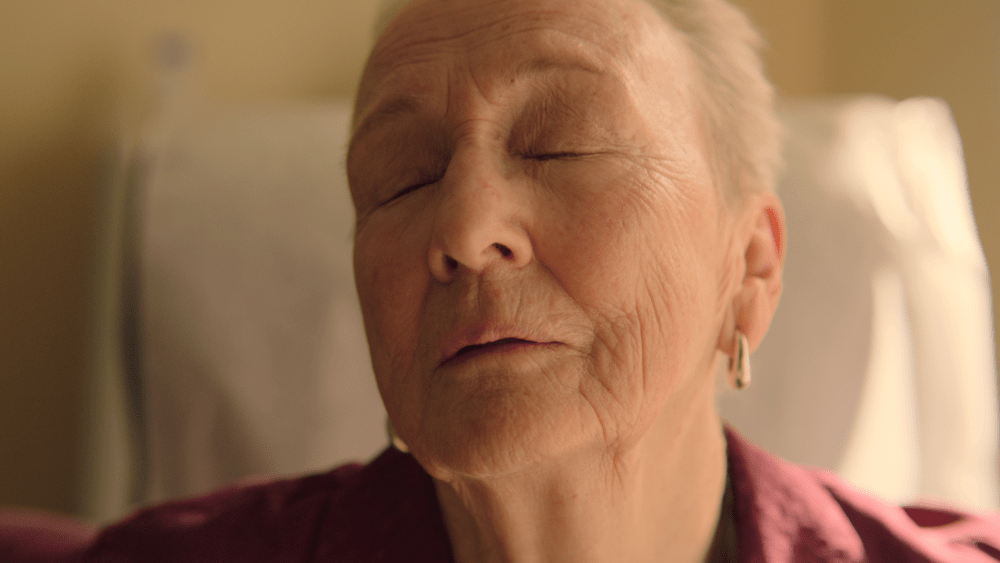Sarah Friedland talks about older adults in ‘Familiar Touch’
Sarah Friedland isn’t done talking about the body just yet.
“My next film will be centered around it too. I’m working on a script that blends dance with narrative storytelling. I’ll probably do it for the rest of my life. At this point, I am too attuned to the rhythms of the body and its politics,” debuting director tells Variety.
In “Familiar Touch,” premiering in Venice’s Orizzonti section, she’s celebrating sensuality of older adults, especially Ruth (“The Affair”), transitioning to life in assisted living. Carolyn Michelle, Andy McQueen and H. Jon Benjamin also star.
“So often, we talk about older adults ‘fading away’ and things getting ‘blurry.’ But as some of their cognitive functions decline, other senses intensify. Touch, taste, smell – it can all become very vivid,” she says.
“For Ruth, I was inspired by the ‘no bullshit’ line of women. What is it like for them to lose autonomy, where so much of their youth was connected to these ideas of feminism and independence? I didn’t want her to fall into these ‘little old lady,’ ‘sweet grandma’ tropes. We tend to eliminate their sexuality or joke about it. To me, that’s infantilizing and absolutely terrifying.”
Following the festival premiere in Italy, Friedland’s planning a series of workshops to accompany further screenings.
“We want to replicate the intergenerational method of how we shot this film. We facilitated a filmmaking workshop for residents at a real assisted living facility called Villa Gardens, encouraging them to make their own films. Later, they joined our cast and crew,” she says,saying the idea for the story originated 15 years ago, when her own grandmother developed dementia.
“She really valued verbal expression. When she became non-verbal and moved into a memory care facility, my family started talking about her as if she was already gone. But whenever I’d visit, she was physically expressive and so present,” she says.
“Haunted” by that dichotomy, Friedland answered an ad from a sculptor with dementia, looking for “part-assistant and part-caregiver.” Later, she ended up working with other New York City artists and creatives suffering from that illness.
“It changed everything I thought I knew about aging, identity and the intimacy of care labor.”
She made “Movement Exercises Trilogy,” including short “Home Exercises,” where older adults navigated their daily routines. She also taught filmmaking in their communities.
“‘Familiar Touch’ was a way to integrate all that: me working with movement and bodies on camera, and working with older adults,” she says, unafraid of going into painful places.
At the beginning of the film — produced by Alexandra Byer for Rathaus Films and Matthew Thurm for Go for Thurm — Ruth is visited by a stranger. He tells her to follow him and she does — straight to the place that will now become her new home. And that attractive man? It’s actually her adult son, Steve.
“It’s very uncomfortable, but so many people experience it with their loved ones. They recognize familiarity and intimacy, but they can’t quite place that relationship. My clients would see me as their peer in terms of age. You learn to meet them where they’re at and to affirm their version of reality,” she observes.
“I wanted to honor Ruth’s desires for intimacy and connection, even when its direction is getting confused, and do it in a way that wouldn’t shame her. I am so grateful to the actors, because they were so open to Ruth and Steve’s experiences. It works because of how much nuance they brought.”
Friedland — who in the past assisted such directors as Steve McQueen and Kelly Reichardt — hopes that after watching the film, viewers will think about their own desires and needs, and will be able to express their wishes for how they would like to be cared for as they age.
“There’s this idea that when older adults go through memory loss, they ‘lose themselves’ too. I see it in so many films, told from the perspective of their children or romantic partners and centered around grief. I wanted to make a film that doesn’t minimize that grief, but for my clients, their everyday life wasn’t marked by tragedy. It included acts of joy, pleasure and interaction.”


